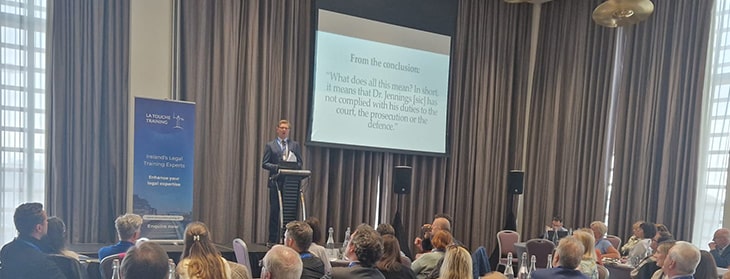
Expert-witness rules ‘scattered’ in Irish system
Almost every well-known miscarriage of justice has involved the misuse of expert evidence, a conference on expert witnesses has heard.
Mark Tottenham BL, author of two books on expert-witness evidence, cited the Dreyfus affair and the Birmingham Six case as examples.
Speaking at the Expert Witness conference, organised by La Touche Training, at the Gibson Hotel in Dublin (23 May), the barrister said that the recent Post Office Horizon affair in Britain was no exception.
Hundreds of postmasters were wrongly prosecuted or convicted for false accounting, theft, and fraud due to glitches in a software system that incorrectly showed money missing from accounts in post-office branches.
‘Partisan view’
Tottenham highlighted several cases arising from the affair in which judges were critical of the evidence given by expert witnesses from the Post Office.
He quoted Justice Fraser’s judgment in Bates and Ors v Post Office Ltd (2019), where the judge said that Dr Robert Worden had become “closely involved in the Post Office’s case” and had taken “a partisan view” of evidence provided by a whistleblower.
Tottenham also pointed to a Court of Appeal judgment in the case of Hamilton & Ors v Post Office Limited (2021), in which the judges noted that a prosecutor’s duty of disclosure continues throughout criminal proceedings, but also after conviction.
Single joint expert
Speaking about the roles and duties of an expert witness, James Nerney BL cited the Rules of the Superior Courts, which say that the duty of such a witness to assist the court “overrides any obligation to any party paying the fee of the expert”.
He told the conference that courts in England and Wales had more developed rules on expert witnesses, which generally followed the Ikarian Reefer principles.
The barrister said that, while the Irish court rules allowed for the appointment of a single joint expert in a case, this was “unusual”, and litigants were still free to appoint their own experts.
He set out some of the arguments for and against this approach, with Mr Justice Jackson noting in a 2005 case that retaining two experts where items of lower value were in dispute would make the litigation prohibitive.
Mr Justice Clarke, however, stated in a 2007 judgment that two experts might come to “widely divergent views” on matters of fact and opinion, and warned of the “extreme danger” of appointing a single expert, adding that it could potentially give rise to an injustice.
Nerney told the event that Irish courts had held that litigants’ rights to engage experts of their choice derived from their constitutional rights. As a result, he added, the appointment of joint single experts was “unlikely” to see a large uptake in Irish courts.
Uncertainty on privilege
Aoife Beirne BL told the conference that there was uncertainty in the Irish system about whether instructions to expert witnesses were covered by privilege, adding that clearer guidelines were needed for experts, judges, and legal advisors.
She said that the rules on expert witnesses were “scattered” around the Rules of the Superior Courts, contrasting this with what she described as the “preferable” system in England and Wales, where Civil Procedure Rules applied in all cases.
A change to these rules in 1998, she noted, set down a wide obligation to disclose such instructions to expert witnesses.
Setting out the arguments against disclosure of instructions, Beirne noted that there were no specific rules on the issue in Ireland and that a 2006 judgment from Mr Justice Finnegan seemed to suggest that privilege could still apply to documents referred to in an expert report.
In contrast, the barrister told the conference, the common-law position was that experts should disclose the facts that formed the basis of an opinion, while there was also an argument that disclosure would provide a level playing field.
‘Inconsistent’ views on investigations
Paul Jacobs of Grant Thornton, who spoke about expert investigating and reporting, said that the tasks of an expert had become “more onerous”, as solicitors had grown more knowledgeable about experts’ independence requirements, procurement processes had become more sophisticated, and regulators were more “tooled up”.
He told the conference that investigating was more difficult than being an expert witness and gave attendees advice on the conduct of such investigations.
Jabobs added, however, that views among the legal profession about the procedures for conducting such reports, such as how and when draft versions should be shared, were “not entirely consistent”.
He urged investigators to be up-front with interviewees on issues such as their rights and stressed the importance of transparency – including providing questions in advance, with no “rabbits out of hats”.
Jabobs added that any relationships with any parties in a case should be disclosed – even if they did not affect the investigator’s independence.
He also told the conference that he believed that people who were sick or unavailable to be interviewed should “probably” still be sent drafts of a report.
The event was moderated by former Court of Appeal judge Mr Justice Michael Peart, who told the event that it was sometimes difficult to decide between two experts who disagreed.